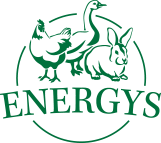Rabbits
Poultry
Laying hens
Quails
Guinea pigs
Pigs
Ostriches
Sheep and goats
Pigeons
Pheasants
Forest animals
Feeding guinea pigs
As guinea pigs are unable to create vitamin C in their bodies similarly to humans, this vitamin must be provided in the fodder.
Every type of an animal has its specifics in feeding. In guinea pigs, it is the need for continuous supply of vitamin C. The guinea pig is the only domestic animal that is not capable of producing this vitamin in its digestion tract (similarly to humans).
The daily dose of vitamin C for an average guinea pig is at least 10 mg and this requirement is much higher in pregnant, nursing or otherwise stressed animals.
Adding fresh green fodder (such as grass), vegetables (such as cabbage) or fruit (apples) is the most common solution for this. Feeding sprouted grains (oat, barley) has been tried successfully in greater breeding operations in the past.
Feeding complete fodder mixtures especially formulated for guinea pigs, which contain vitamin C, is currently the easiest solution.
All pet owners want to prepare diverse feeding doses for our pets, which is why they add hay, pieces of fruit or vegetables to pellets and naturally provide a good-quality drinking water.
Related posts
5. October 2018
As guinea pigs are unable to create vitamin C in their bodies similarly to humans, this vitamin must be provided in the fodder.
